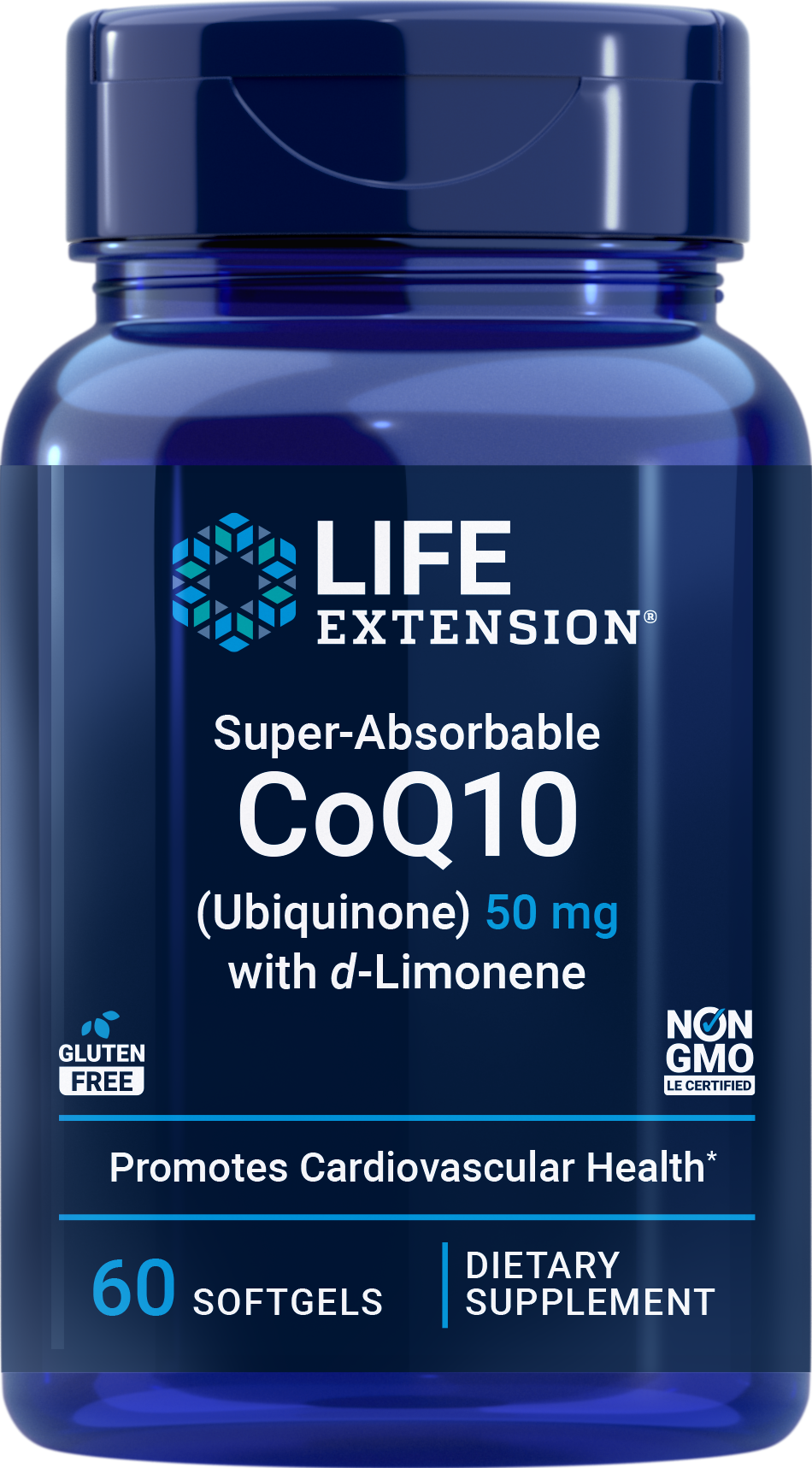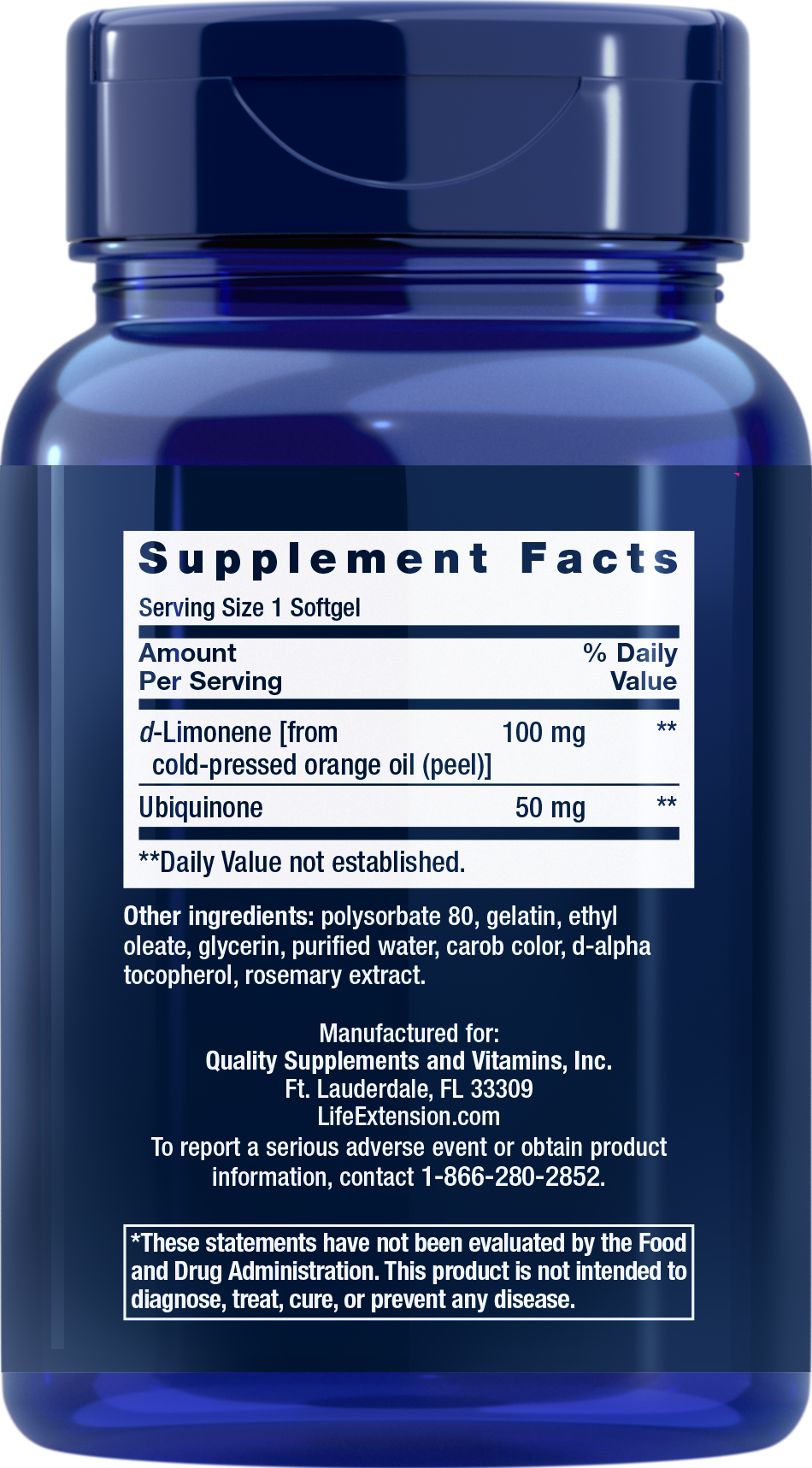Super-Absorbable Ubiquinone CoQ10 with d-Limonene, 60 softgels
Promotes heart and brain health
Super-Absorbable Ubiquinone CoQ10 with d-Limonene, 60 softgels
Promotes heart and brain health
For you, if you are looking for a highly absorbable heart & brain health support formula
The innovative formula of Super-Absorbable Ubiquinone CoQ10 with d-Limonene can:
- Promote cardiovascular health
- Support healthy energy production
- Encourage heart & brain health
- Offer powerful antioxidant support
- Promote superior absorption thanks to d-Limonene
Ubiquinone CoQ10 is a crucial nutrient involved in the process for the production of energy at the cellular level. Regular production of CoQ10 decreases over time. Super-Absorbable CoQ10™ with d-Limonene offers a higher dose with the powerful absorption properties of d-Limonene, which is found in orang peel oil.

on orders over € 69
We have a 100 days return policy, not the standard 30 days!
Order before 11:00 CET, for same day shipping (Mon-Fri)
We can help you in 6 languages
Health benefits at a glance:
Super-Absorbable CoQ10 (Ubiquinone) with d-Limonene is a super absorbable and very cost-effective CoQ10 supplement formula. CoQ10 plays an essential role in supporting a healthy mitochondrial function because it is required in the body to convert fats and sugars into energy for the cells.
However, as the body ages, the natural production of CoQ10 declines. With ample levels of CoQ10 in the body the mitochondria can work efficiently in cells all over the body.
Why it works:
When CoQ10 supplementation is taken through the mouth, just some of it will be absorbed into the bloodstream. However, higher doses of CoQ10 can provide better effects than typical dosages.
CoQ10 is a very expensive nutrient, why a viable option to taking higher doses is to increase the amount of CoQ10 which can be absorbed in the body.
CoQ10 is a potent antioxidant, which helps protect the DNA of mitochondria, lipids and proteins from oxidation. Furthermore, it also supports the function of mitochondria, which are the “powerhouses” of cells.
It does so by contributing to the mitochondria’s production of ATP which is the body’s main source of energy. When the body starts to age, the production of CoQ10 decreases, which on the other hand can result in lower production of ATP. The good news is that CoQ10 can easily be supplemented.
Super-Absorbable CoQ10 (Ubiquinone) with d-Limonene contains CoQ10 in its ubiquinone form in a highly intensified format. The absorption of CoQ10 is aided by d-Limonene which is a natural compound found in orange oil. d-Limonene helps CoQ10 absorption by breaking down CoQ10 particles, reducing their size thereby increasing CoQ10 absorbability in the body [12-17].
The science behind the product:
CoQ10 is a vital component to the human body because it helps convert food into ATP, the body’s main source of energy. When CoQ10 levels are optimized in the body, the cells can therefore function optimally.
Research indicates that CoQ10 supplementation is a very effective way to support various organs in the body, including eyes, kidneys, and brain.
CoQ10 comes in two forms: ubiquinone and ubiquinol. Most ubiquinone is converted to its active form ubiquinol when it enters the body. CoQ10 is essential in transferring food into ATP energy molecules which is the main type of energy used in the cells.
CoQ10 deficiency affects the cell mitochondria (the “powerhouses” of the cells) negatively. This is because CoQ10 plays an essential role in transporting electrons from food molecules into ATP molecules which creates energy for the cells.
Furthermore, CoQ10 deficiency has been linked to a number of age-related issues. Moreover, CoQ10 supplementation has also been found to be effective in increasing CoQ10 blood levels, and supporting the function of a diverse range of high-energy consuming organs such as the heart, brain, and kidneys.
How to use:
- Take one (1) capsule daily, with or without food, or as recommended by a healthcare practitioner.
Serving size 1 softgel
Amount per serving:
| d-Limonene [cold-pressed orange oil (peel)] | 100 mg |
| Ubiquinone | 50 mg |
Other ingredients:
Polysorbate 80, gelatin, ethyl oleate, glycerin, purified water, carob color, d-alpha tocopherol, rosemary extract.
Dosage and use:
Take one (1) softgel daily with food, or as recommended by a healthcare practitioner.
Warnings:
- Keep out of reach of children.
- Do not exceed recommended dose.
- Do not purchase if outer seal is broken or damaged.
- If you are undergoing treatment for a medical condition or if you are pregnant or lactating, please consult your medical practitioner first.
- A food supplement should not be used as a substitute for a varied and balanced diet and a healthy lifestyle.
- Store tightly closed in a cool and dry place.
- Biochim Biophys Acta Bioenerg. 2016;1857(8):1073-1078.
- J Am Coll Nutr. 2001;20(6):591-598.
- Mitochondrion. 2007;7:S2-S7.
- Neuropsychiatr Dis Treat. 2009;5:597-610.
- Curr Atheroscler Rep. 2018;20(6):29.
- Clin Physiol. 1988;8(4):391-398.
- Mitochondrion. 2007;7:S41-S50.
- Mol Biotechnol. 2007;37(1):31-37.
- Front Physiol. 2018;9:44.
- Mech Ageing Dev. 2010;131(4):225-235.
- Recent Pat Drug Deliv Formul. 2010;4(3):245-255.
- Drug Deliv. 2016;23(6):1868-1881.
- AAPS PharmSciTech. 2004;5(4):e66.



